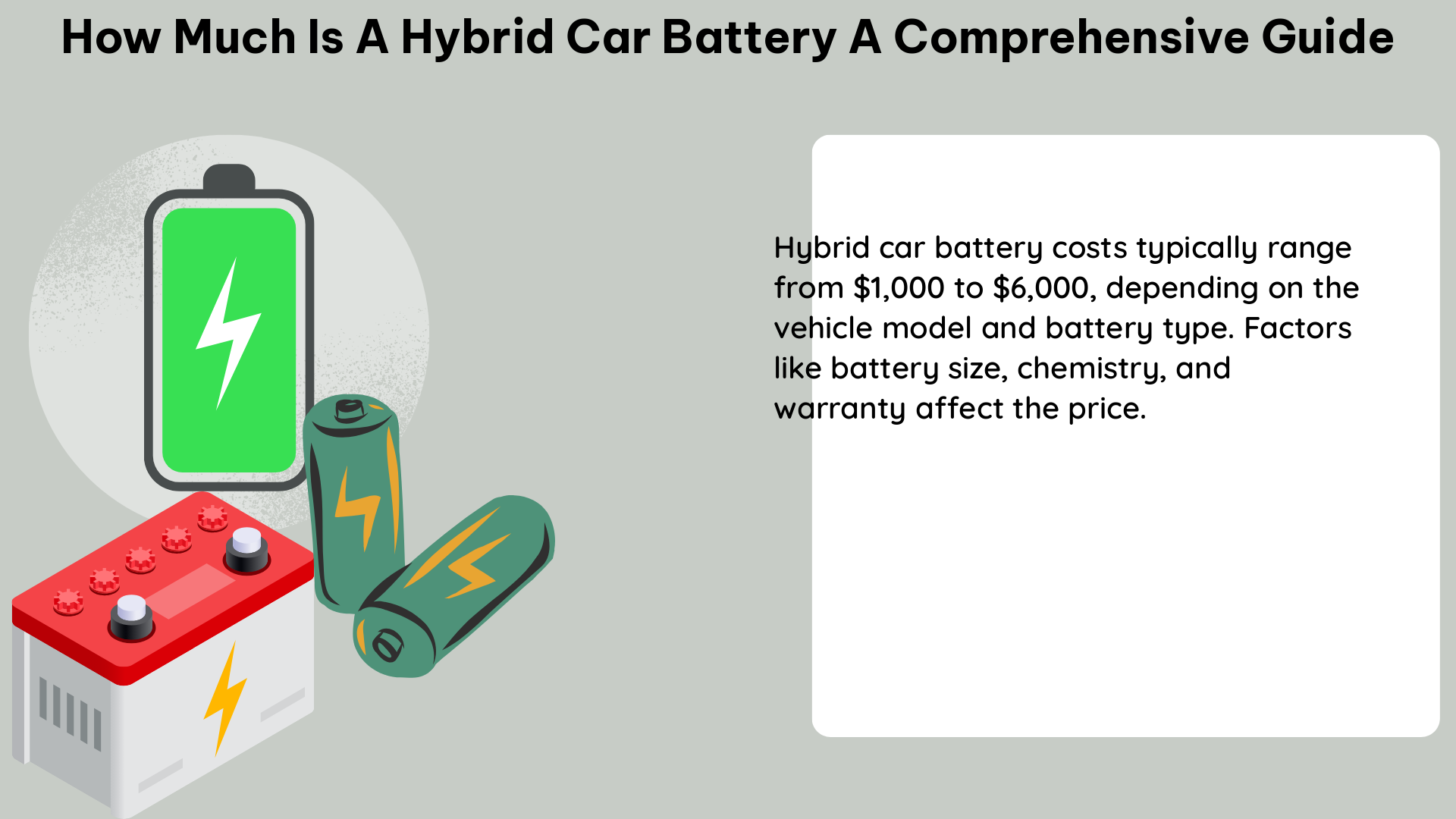A hybrid car battery is a crucial component of a hybrid vehicle, providing power to the electric motor and enabling the vehicle to switch seamlessly between gasoline and electric power. The cost of a hybrid battery can vary significantly depending on the make, model, and age of the vehicle. Understanding the intricacies of hybrid car batteries is essential for both owners and prospective buyers.
Hybrid Battery Costs: Navigating the Price Range
The cost of a hybrid car battery can range from a few hundred dollars to several thousand, depending on various factors. Here’s a breakdown of the typical costs:
- New Hybrid Batteries:
- Toyota Prius (2010-2015): Around $2,495 from a dealership
- Lexus CT200h (2010-2015): Approximately $3,295 from a dealership
-
Honda Civic Hybrid (2006-2011): Approximately $2,700 from a dealership
-
Reconditioned/Remanufactured Hybrid Batteries:
- Typically start at around $890 for hybrid cars
- Offer a more cost-effective alternative to new batteries
-
Undergo a thorough refurbishment process to ensure reliability
-
Aftermarket Hybrid Batteries:
- Can be found for as low as $500, but quality and warranty may vary
- Require careful research to ensure compatibility and reliability
It’s important to note that the cost of a hybrid battery can also be influenced by factors such as the vehicle’s age, mileage, and the specific battery chemistry used.
Hybrid Battery Lifespan: Expectations and Considerations

The lifespan of a hybrid car battery is a crucial factor to consider. On average, hybrid batteries are designed to last between 8 to 12 years, but this can be affected by various driving conditions and usage patterns.
Factors that can impact hybrid battery lifespan:
- Driving Conditions: Frequent high-speed driving, extreme temperatures, and heavy loads can accelerate battery degradation.
- Battery Usage: Aggressive acceleration, frequent regenerative braking, and extended periods of high-power demand can shorten battery life.
- Battery Maintenance: Proper maintenance, such as regular battery checks and cooling system upkeep, can help extend the battery’s lifespan.
If a hybrid car battery is not providing enough energy, showing signs of reduced performance, or making increased engine noise, it may be a sign that the battery is not functioning properly and should be tested by a qualified technician as soon as possible.
Hybrid Battery Safety and Recycling Considerations
Hybrid car batteries are generally safe and reliable, but there are important safety considerations to keep in mind when handling or maintaining them.
- Safety Procedures:
- Proper training and personal protective equipment (PPE) are essential when working with high-voltage hybrid battery components.
-
Ensuring the cooling system is functioning properly to prevent overheating is crucial.
-
Hybrid Battery Recycling:
- Hybrid car batteries contain hazardous materials that can harm the environment if not disposed of properly.
- However, they also contain valuable metals and materials that can be recycled and reused.
- Specialized recycling services, such as those offered by Exclusively Hybrid, work with certified partners to ensure responsible battery recycling and proper handling of hazardous materials.
The Future of Hybrid Car Batteries: Advancements and Innovations
The future of hybrid car batteries looks promising, with advancements in technology and a growing demand for eco-friendly vehicles.
- Solid-State Batteries:
- Solid-state batteries use solid electrolytes instead of liquid electrolytes found in traditional lithium-ion batteries.
- This technology offers the potential for increased energy density, longer lifespan, and improved safety compared to traditional lithium-ion batteries.
-
Automakers are actively researching and developing solid-state battery technology for future hybrid and electric vehicles.
-
Battery Capacity and Efficiency Improvements:
- Ongoing research and development in battery chemistry, cell design, and thermal management are leading to incremental improvements in energy density, power output, and overall efficiency.
-
These advancements can translate to longer electric-only driving ranges and improved fuel economy for hybrid vehicles.
-
Recycling and Reuse Initiatives:
- As the demand for hybrid and electric vehicles grows, the need for responsible battery recycling and reuse will become increasingly important.
- Initiatives like those from Exclusively Hybrid are paving the way for sustainable battery management, ensuring hazardous materials are handled properly and valuable resources are recovered and reused.
By understanding the comprehensive guide on hybrid car battery costs, lifespan, safety, and future advancements, hybrid vehicle owners and prospective buyers can make informed decisions and contribute to the ongoing evolution of eco-friendly transportation.
References:
– Hybrid Battery Costs and Lifespan
– Hybrid Battery Recycling and Safety
– Tesla Impact Report on Battery Recycling

The lambdageeks.com Core SME Team is a group of experienced subject matter experts from diverse scientific and technical fields including Physics, Chemistry, Technology,Electronics & Electrical Engineering, Automotive, Mechanical Engineering. Our team collaborates to create high-quality, well-researched articles on a wide range of science and technology topics for the lambdageeks.com website.
All Our Senior SME are having more than 7 Years of experience in the respective fields . They are either Working Industry Professionals or assocaited With different Universities. Refer Our Authors Page to get to know About our Core SMEs.